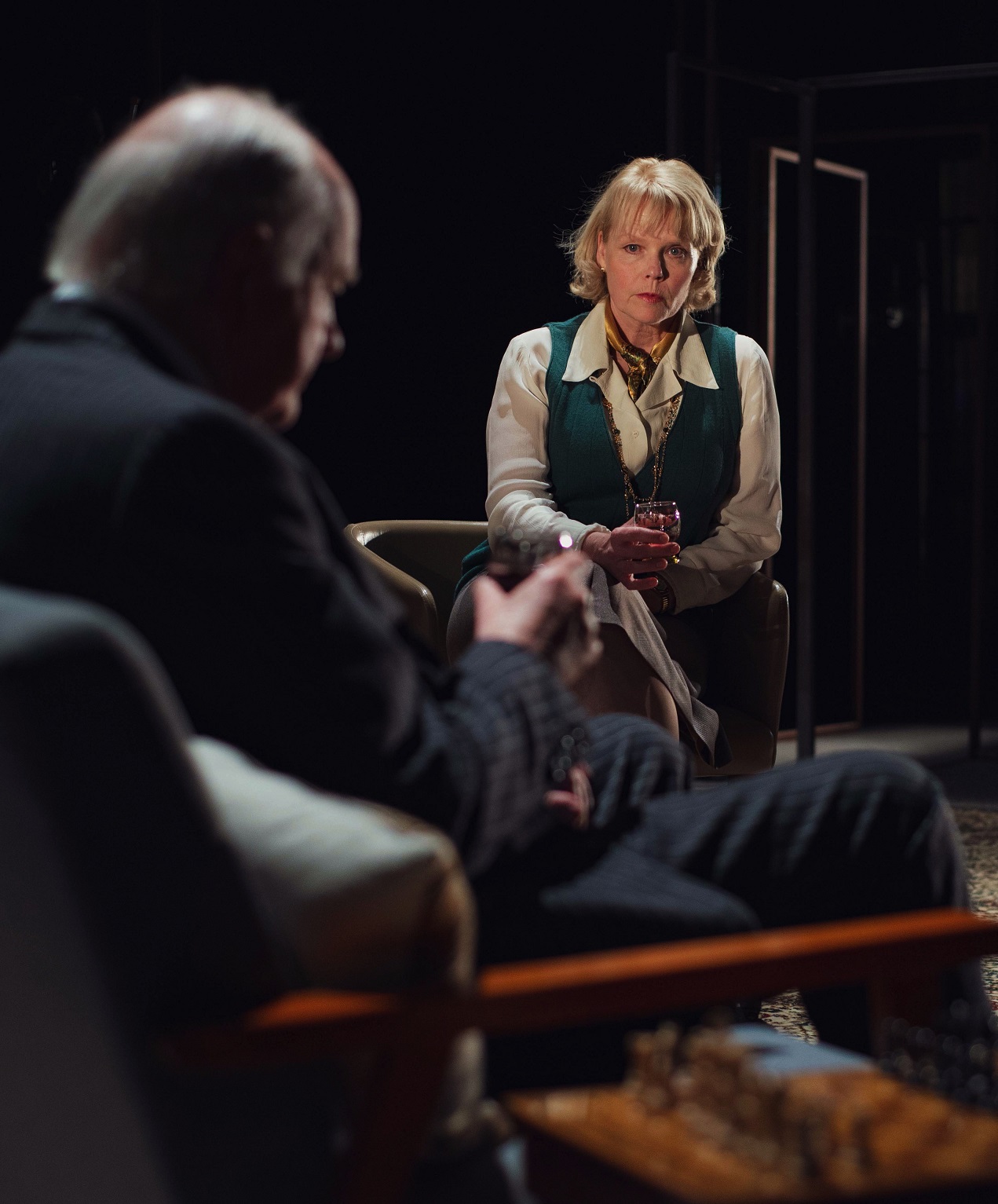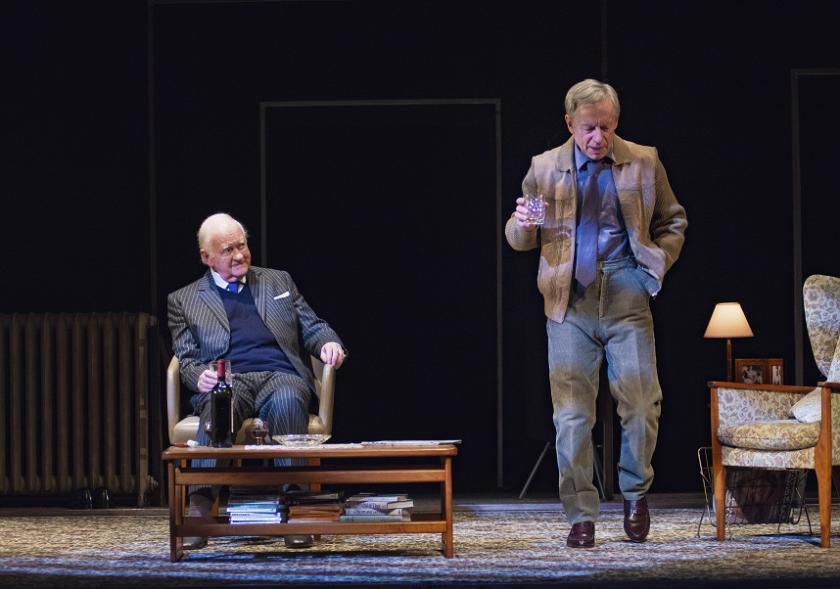There’s such a genial feel to the pairing of Oliver Ford Davies and Stephen Boxer in Ben Brown’s new play that there are moments when we almost forget the weighty historical circumstances that lay behind the long-awaited encounter between two old friends, this evening of conversation and drinking, that is its subject. For Brown’s protagonists are sometime MI6 colleagues Graham Greene and Kim Philby, reunited in Moscow in 1987 as the former, now one of the world's best-known writers, pays a visit to his old acquaintance, the defector ensconced in the third decade of his Soviet exile.
Of the “Cambridge spies”, those who moved from 1930s student communist allegiances to pass secrets to the Soviets, Philby’s treachery was surely the most devastating. Attempting to understand their motivations and assess their deeds has become a speciality in its own right, a rich territory occupied by historians and biographers alike. And writers too, prime among them to date Alan Bennett, whose 1983 television play An Englishman Abroad was a study of Guy Burgess in exile, seen through the prism of a real-life encounter with actress Coral Browne in Moscow at the end of the 1950s.
 Set in Philby’s central Moscow apartment in February 1987, A Splinter of Ice records a far more poised meeting during Greene’s visit to a peace conference in the city. It’s their first encounter since the spy’s 1963 defection, though the two were in periodic contact by letter, and the novelist had written a preface to Philby’s memoir My Silent War that revealed the degree of Greene’s understanding – distinctly rare among their contemporaries – of the path that his friend had taken. Greene would remain resolutely silent about what took place between the two of them this time.
Set in Philby’s central Moscow apartment in February 1987, A Splinter of Ice records a far more poised meeting during Greene’s visit to a peace conference in the city. It’s their first encounter since the spy’s 1963 defection, though the two were in periodic contact by letter, and the novelist had written a preface to Philby’s memoir My Silent War that revealed the degree of Greene’s understanding – distinctly rare among their contemporaries – of the path that his friend had taken. Greene would remain resolutely silent about what took place between the two of them this time.
Thus, Brown faces a challenge as dramatist in establishing context and background sufficient for the general viewer from material which would have been largely familiar to his characters, even allowing for the catching up they had to do. “No questions” is almost the first condition put forward when Ford Davies’ Greene enters the living room of Philby’s home, furnished in a distinctly Spartan Soviet style in Michael Pavelka’s design, yet his task is to draw his companion into talking – about more fundamental issues as well as the quotidian details of his Soviet life, the routine of his day, the holidays, most of all the companionship of his devoted wife Rufa (played here with cheerful empathy by Sara Crowe, pictured above, though the role feels underwritten). The resulting process of elicitation-elucidation, with Ford Davies as quasi-interrogator, occasionally shows through, though it’s moderated by an appealing balance between the two performers.
As Greene, 83 at the time of this meeting and almost a decade senior, Ford Davies has a wonderfully mournful demeanour in a pin-stripe suit that manages to look on the shabby side, his face, somehow wry with regret, complemented by a slowness of delivery and falling intonations. Boxer is a nice contrast, his Philby revealing an occasionally testy wit as well as a fleetness of articulation that makes clear he is the more nimble one, both on his feet and verbally. A Splinter of Ice is spare in moments of frisson that genuinely disturb the easy familiarity of the encounter, but when Ford Davies’ subtle probing hits home, the agile Boxer is taken off guard, his “chilling certainty” swallowed like a gulp in the throat.
Greene challenges Philby about the post-war agents whom he sent to certain death
One such instance marks the end of the first act: Greene hits the heart of the matter when he spots a scar on Philby’s wrist – trace of a suicide attempt, a silent refutal of the line taken by the defectors that they had no regrets. That was a concern for Burgess in An Englishman Abroad, and it’s here in Philby’s insistence that his moment of arrival in the USSR brought the confident insight, “I was free at and home at last.” (Brown conveys well the circumstances of these transplanted lives, the details of fluctuating friendships with fellow double agents like Donald Maclean and George Blake, the level of anecdote never quite overdone.)
But the moment when Boxer’s Philby is really brought to a halt comes later, as Greene challenges him about the post-war agents whom he sent behind enemy lines to certain death. How they had looked up to him, Greene insists, to which Philby counters carelessly that many of them were ex-Nazis anyway. “Not the two young Georgians,” his interlocutor insists, the words hanging in the air with a force that is rare here: the “splinter of ice”, which Greene described elsewhere as the essential attribute of a writer, has penetrated. It leaves us wishing that Brown had gone further elsewhere in the play, beyond all the old-school understatement, towards “the sharp touch of the icicle in the heart” of which Greene had written in his preface to Philby’s memoirs.
The playwright throws in an intriguing late twist of plot, however, and Alan Strachan and Alastair Whatley’s confident production, filmed at Cheltenham’s Everyman Theatre for Original Theatre Company and available online until the end of July, brings a surprise of its own, a very welcome one: it is due to start a national tour, back on the stage as we used to know it, in Malvern in June. There’s a lovely balance of intimacy between Oliver Ford Davies and Stephen Boxer here that will surely settle further in the course of regular performance. Watching these two consummate old pros at work is the most satisfying pleasure of this satisfyingly accomplished piece of filmed drama.















Add comment